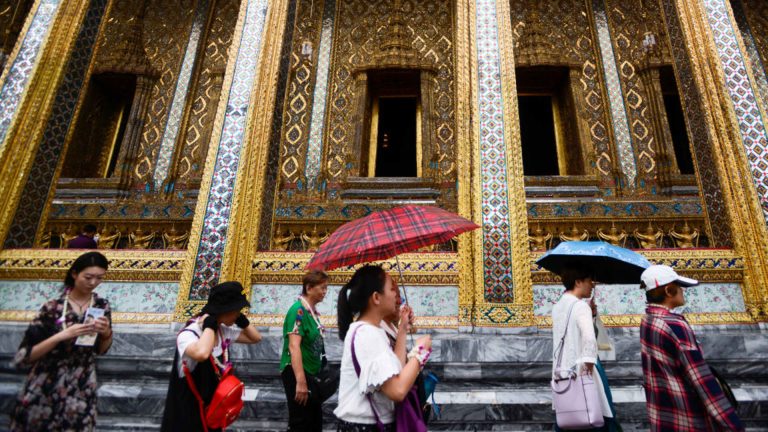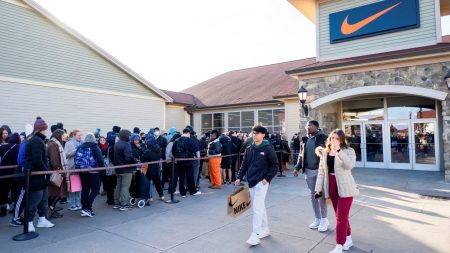Japan and Thailand are two of the most popular places to visit in Asia.
But both are losing ground with Chinese nationals as safety concerns rise among younger travelers.
Both countries were the top choices for Chinese holidaymakers earlier this year but fell in the third quarter — Thailand to No. 6 and Japan to No. 8 — according to the marketing company China Trading Desk, which gauges Chinese travel sentiment on a quarterly basis.
Japan: food safety
The release of treated radioactive wastewater from Japan’s Fukushima nuclear power plant into the Pacific Ocean in August has significantly affected how Chinese people feel about traveling there, said Subramania Bhatt, CEO of China Trading Desk, the marketing agency behind the survey.
China Trading Desk’s survey of more than 10,000 Chinese citizens — 94% of whom are under the age of 40 — showed eating great food (23%) was the top motivator for outbound travelers, topping local history and culture (22%), nature (22%) and shopping (10%).
The World Health Organization and other safety groups have said seafood from Japan is safe to eat, but fears among Chinese travelers have “turned one of their most popular destinations into one of their least popular,” Bhatt said.
Thailand: scamming compounds
In a twist on the “set-jetting” trend — in which movies and television shows attract tourists to visit their filming locations — several blockbuster movies released this summer are dissuading Chinese travelers from visiting Thailand.
Recent Chinese movies “Lost in the Stars” and “No More Bets” are both fictional, and neither is set in Thailand, but some say the plotlines closely mirror real-life events that have made headlines in recent years — including a Chinese woman who was pushed from a cliff by her husband in Thailand in 2019. (She broke 17 bones — but survived.)

This is especially true of “No More Bets,” which follows a young couple lured to Southeast Asia to take new jobs, only to get trapped in an online scamming compound — a situation the United Nations estimates is happening to hundreds of thousands of people in the region.
Many compounds are in the border areas outside of Thailand — in Cambodia, Laos and Myanmar — often in special economic zones where there is “little to no rule of law,” according to the United Nations. Victims come from across Southeast and South Asia, as well as mainland China, Taiwan and even as far as Latin America, it said.
The problem has grown since the Covid-19 pandemic, said Pia Oberoi, senior advisor on migration and human rights in Asia-Pacific for the United Nations Human Rights Office of the High Commissioner, as the clientele of casinos operators dwindled in the wake of Covid-related border shutdowns.
“A number of compounds … have been repurposed by transnational crime groups into places in which people are forced to kind of carry out scams against other people. So we say there’s two sets of victims here … the people that have been scammed in many cases from lots and lots of money, but also others that are forced to take part in perpetrating these scams in the centers around the Southeast Asia region,” she told “Squawk Box Asia” on Monday.
Beyond scams, the areas are said to operate as “lawless playgrounds,” where trafficking of drugs, wildlife and humans is rife.
“This is an incredibly lucrative business. There are billions of dollars that are being generated,” said Oberoi.
Dangers to tourists?
Rumors of dangers to travelers have spread across Chinese social media, but Oberoi noted she hasn’t seen any evidence of tourists “being snatched up off the streets and dragged into these centers.”
“In fact, the methods of recruitment are actually much more sophisticated,” she said, which can include using recruitment platforms to give the impression job-seekers are headed to real jobs.
She said governments are taking steps to intervene, but more needs to be done to break up entrenched issues in the region related to corruption and enforcing the rule of law.
“We’ve seen a roadmap between ASEAN and the People’s Republic of China around law enforcement response, but what we really want to put a focus on is, of course, the people that have been caught up,” she told CNBC. “There’s been some horrific levels of violence and abuse seen by the people that are being forced to commit these crimes.”
Tourism as a catalyst for change
In 2019, some 11 million Chinese travelers visited Thailand — making China the country’s largest source market for incoming visitors, according to Reuters.
As of September, fewer than 2.5 million Chinese nationals have visited Thailand, according to Thailand’s Ministry of Tourism & Sports — far less than the 5 million Thai authorities projected would arrive this year.
As for whether tourism — of all things — could exert economic pressure on Southeast Asian governments to do more, Oberoi said, “We hope that a human rights response sees a way forward — governments will understand that actually the reputation of the country does depend on a comprehensive response.”
Cambodia has banned “No More Bets” from theaters, which hasn’t stopped it from grossing nearly $500 million in China, as of early September.
“Some viewers of ‘No More Bets’ have even expressed fears that traveling to the region could jeopardize their lives,” said China Trading Desk’s Bhatt. “Over time, Southeast Asia has increasingly become associated with danger, and what was once a popular destination for outbound tourism has now acquired a negative connotation.”
Read the full article here









